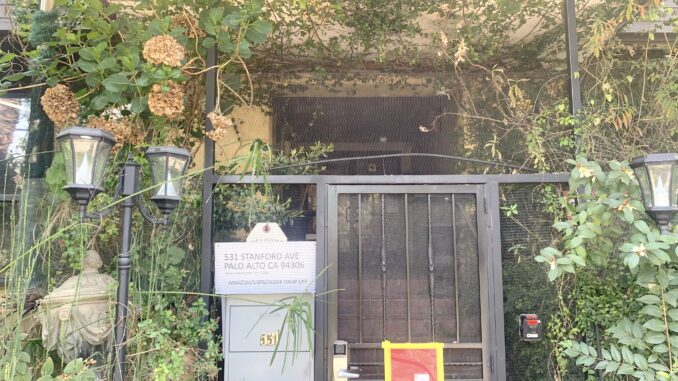
BY BRADEN CARTWRIGHT
Daily Post Staff Writer
The owner of a boarded-up hotel in Palo Alto that was converted to an illegal dorm for Stanford students has applied to put 22 modular homes on the property.

The three-story modular homes would be 15 feet wide and 48 feet long, laid out in a grid at 531 Stanford Ave., plans show.
The development would replace the old Stanford Terrace Inn that’s been boarded up for over a year behind the Starbucks at 2000 El Camino Real.
Attorney Brian O’Neill filed the application on Aug. 27 on owner Sophia Huang’s behalf. He invoked state housing laws that give the project an easier path to approval.
“Despite prior challenges, the applicant has continued to engage in good-faith discussions with city personnel in recent years in an effort to develop a plan responsive to the city’s goals and housing obligations,” O’Neill said in a letter to Planning Director Jonathan Lait.
The city started looking into the Stanford Terrace Inn in September 2023 after firefighters responded to a medical call and noticed issues with the sprinklers and alarms, city spokeswoman Meghan Horrigan-Taylor said at the time.
The building had plastic film on the ceilings, mold in the basement and a balcony at risk of collapse, Chief Building Official George Hoyt said in a notice of violation.
The city red-tagged the building as a danger to enter, and residents haven’t been happy about its condition.
“Not only is it an eyesore, it is a fire hazard, a terrible precedent to set vis-a-vis planning and development for a site, and a breeding ground for rodents,” College Terrace resident Annette Ross said in an email to council on July 27.
Many of the former residents moved to Extended Stay America in Mountain View or found somewhere to rent closer to Stanford, Huang’s attorney Isaac Winer said in April 2024.
Six tenants – Jun Li, Justin Jacob, Jonas Nikoloff, Ming Yang, Dongsheng Han and Dena Bahmani – sued Huang and her companies in October 2024.
Huang allegedly made the tenants sign a release of liability in exchange for relocation assistance, which is required by the city when tenants are evicted at no fault of their own.
The relocation assistance is for two months of fair market rent – $4,766 for a studio, $5,388 for a one-bedroom unit and $6,264 for a two-bedroom unit.
Huang allegedly targeted Stanford graduate students because“they were foreigners with money and a need for housing since they were students, but completely unfamiliar with tenant laws,” the lawsuit said.
Attorney Steven Ellenberg, representing Huang’s “Stanford Lodging Club,” called the lawsuit a cash grab seeking $3 million per resident when they were already paid relocation assistance.
Judge William Monahan dealt a blow to the tenants on July 30 when he tossed out more than half of their claims. He said tenants aren’t allowed to sue a landlord for violating the city’s building code.
The tenants didn’t give the landlord a chance to fix any issues with the building, nor did they show they experienced “serious emotional distress,” Monahan said in his ruling.
The tenants agreed to confidentially settle their lawsuit with Huang on Aug. 4, court records show.

Be the first to comment